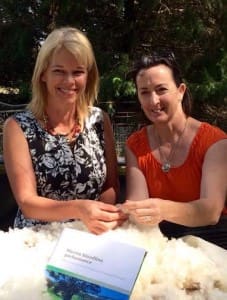
NSW Minister for Primary Industries, Katrina Hodgkinson, left, with DPI research scientist, Sue Hatcher, at the Merino Bloodline Performance launch.
Sheep breeders can now rank wool-producing bloodlines on profitability and genetic traits with the release of the Merino Bloodline Performance report this week.
The report tracks the profitability and performance of 71 Merino bloodlines in wether trials and a ewe productivity trial conducted across four states.
It was released yesterday by the NSW Minister for Primary Industries, Katrina Hodgkinson, who said the production differences shown in the report translate into very significant differences in bloodline profitability. Bloodlines can be compared on the profit per head or profit per dry sheep equivalent (DSE), she said.
“Merino breeders can now use the Merino Bloodline Performance information to identify the relative performance of bloodlines and finetune their breeding programs.”
The report outlines important determinants of Merino profitability, 11 traits and two measures of financial performance.
“The Department of Primary Industries (DPI) analysis of 22 wether trials in NSW, Victoria, Western Australian and Tasmania, reveals that the bloodlines varied across a range of 3.5 microns in fibre diameter, 30 per cent in clean fleece and 23 per cent in live weight,” Ms Hodginson said.
Report can be used to match bloodlines to breeding objectives
DPI research scientist, Sue Hatcher, said Merino producers can confidently use the data from Merino Bloodline Performance to assist in selecting bloodlines that best suit their breeding objectives.
“One ewe productivity trial and 22 wether trials have each run from between two to four years, ensuring high accuracy in the data collected,” Dr Hatcher said.
“This information gives a very reliable indication of potential profitability from the bloodlines.
”Genetic data has been isolated from seasonal and geographic environmental differences by grouping multiple bloodlines into teams of wethers across the trial sites.”
The NSW wether trials ran from 2004 to 2014 in the Central Tablelands, Central West, Northern Tablelands, Southern Tablelands and the Monaro.
Report is part of AWI’s investment in genetic research
Australian Wool Innovation’s general manager of research, Paul Swan said the Merino Bloodline Performance report was an example of AWI’s investment in genetic research, development and extension.
“Wether trials are a really important way for commercial growers to benchmark their own performance or that of the major Merino bloodlines in a commercial setting.
“It is a key part of our national sheep genetic improvement landscape, and for this reason, AWI is very pleased to continue our long association with Merino Bloodline Performance analysis.”
The Merino Bloodline Performance report was funded by Australian Wool Innovation (AWI) and the NSW Department of Primary Industry. More information and copies of the report are available online at www.merinobloodlines.com.au
Source: NSW DPI

HAVE YOUR SAY